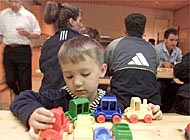Immigrants occupy church in bid to secure residency

A group of immigrants is continuing its occupation of Fribourg's St Paul's church, with the blessing of the parish authorities, in a bid to win the right to remain in Switzerland.
The 100-strong collective includes immigrants from Africa, South America, the Balkans and the European Union.
Fribourg’s justice director, Claude Grandjean, and a police official visited the immigrants on Tuesday evening and said the authorities would not take steps to evict them.
Grandjean said that because the sit-in was taking place with the consent of the parish authorities, there could be no question of police involvement.
The protest was organised by the Swiss Immigration Contact Centre (SICC), which said the protesters include asylum seekers, as well as people who were legitimately employed in Switzerland, but had lost their legal status.
The secretary of the Fribourg-based group, Gaétan Zurkinden, told swissinfo: “Many people came as refugees but didn’t get the necessary documentation to stay. There are also some people who sought work illegally in Switzerland, as well as people who came as students and no longer have the right to stay.”
Zurkinden said the protesters are victims of Switzerland’s restrictive immigration policies, which he believes “are the most complicated in Europe”. He added that immigrants “can often live in Switzerland for up to 10 years and then be stripped of their working and living permits”.
The SICC said it organised the Fribourg sit-in to challenge Swiss immigration laws and to encourage immigrants in other areas of Switzerland to join the movement “to allow people to live and work wherever they want”.
However, Zurkinden admits he is uncertain whether the demonstration will make an impact on the Swiss authorities. “I think that the tactic of the government will be to wait and hope that the demonstration will end within a few weeks.”
Dominique Boillat, a spokesman for Federal Refugee Office, said the government would find it difficult to issue work permits and visas to the protesters. According to Boillat, the group’s main challenge is to identify true asylum seekers from people who simply want to work in Switzerland.
“These people are not only asylum seekers,” Boillat told swissinfo. “A lot of people taking part in this movement are just here to work illegally. They are foreigners without visas and they have nothing to do with asylum.”
Boillat said the Federal Refugee Office would attempt to identify true asylum seekers taking part in the protest through a special procedure, which is very different to a work permit or visa application.
“Switzerland has a rather restrictive immigration system and every year we allow a certain number of people to come enter the country and work. These people get work permits, but we have no way of giving permits to all of them.”
Boillat said some of the demonstrators might be able to get a “humanitarian permit” but he emphasised that the conditions for receiving a work permit in Switzerland are very stringent.
This is the second time in just over a month that a church has been occupied.A group of immigrants took over the Bellevaux church in Lausanne at the end of April.
swissinfo

In compliance with the JTI standards
More: SWI swissinfo.ch certified by the Journalism Trust Initiative
You can find an overview of ongoing debates with our journalists here. Please join us!
If you want to start a conversation about a topic raised in this article or want to report factual errors, email us at english@swissinfo.ch.